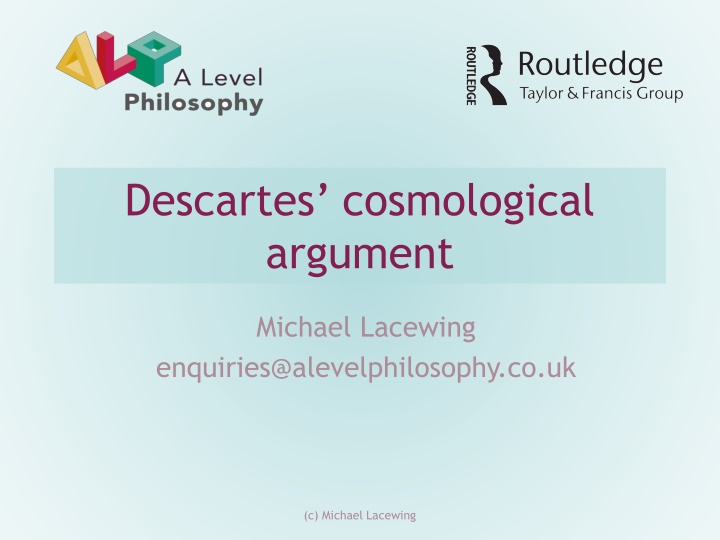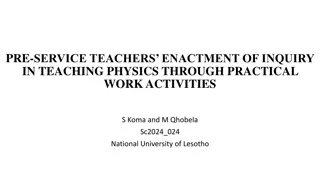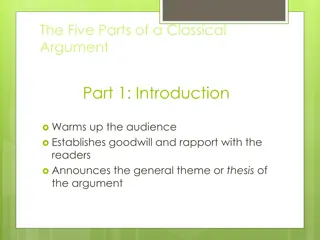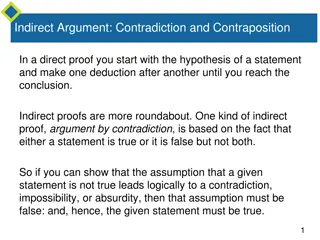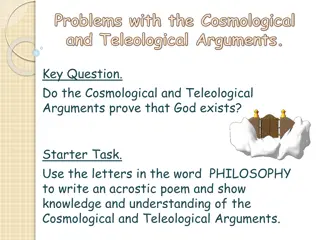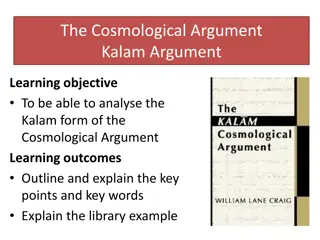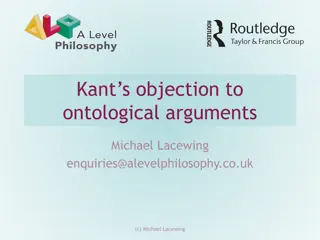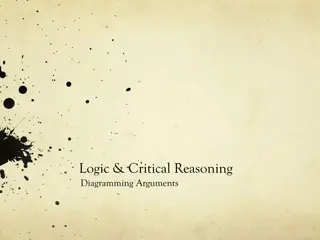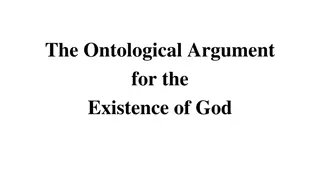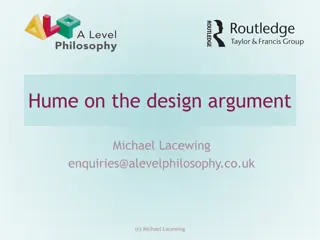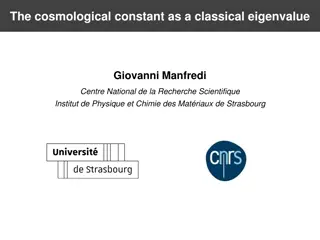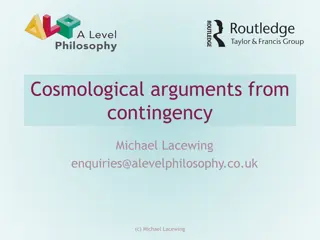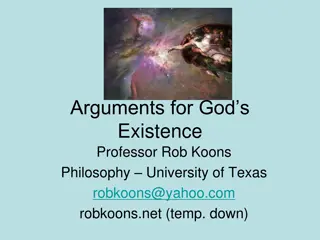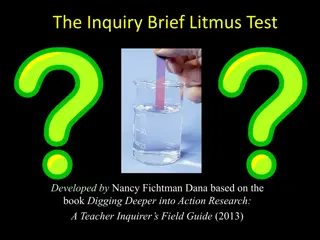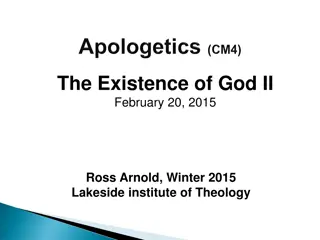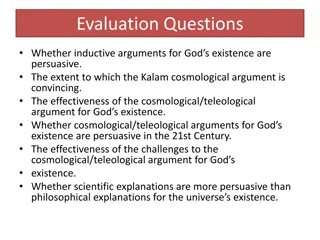Descartes' Cosmological Argument and Existence Inquiry
Descartes presents a cosmological argument questioning the existence of anything, focusing on what causes his own existence. He explores different aspects such as perfection, dependency, and the idea of God as a necessary cause for existence. Challenges about the nature of continued existence are also addressed in response.
Download Presentation

Please find below an Image/Link to download the presentation.
The content on the website is provided AS IS for your information and personal use only. It may not be sold, licensed, or shared on other websites without obtaining consent from the author.If you encounter any issues during the download, it is possible that the publisher has removed the file from their server.
You are allowed to download the files provided on this website for personal or commercial use, subject to the condition that they are used lawfully. All files are the property of their respective owners.
The content on the website is provided AS IS for your information and personal use only. It may not be sold, licensed, or shared on other websites without obtaining consent from the author.
E N D
Presentation Transcript
Descartes cosmological argument Michael Lacewing enquiries@alevelphilosophy.co.uk (c) Michael Lacewing
Descartes question Cosmological arguments usually ask why does anything exist ? Descartes doubts the existence of everything, and offers his cosmological argument after showing only that he exists So his question is what causes his existence He only knows that he exists as a mind, not whether or not he also has a body (c) Michael Lacewing
The argument (I) If I cause my own existence, I would give myself all perfections (omnipotence, omniscience, etc.). I do not have all perfections. Therefore, I am not the cause of my existence. (c) Michael Lacewing
The argument (II) A lifespan is composed of independent parts, such that my existing at one time does not entail or cause my existing later. My existence is not uncaused. Therefore, some cause is needed to keep me in existence. I do not have the power to cause my continued existence through time. Therefore, I depend on something else to exist. (c) Michael Lacewing
Discussion Obj: my continued existence doesn t require a cause because nothing changes Reply: this misunderstands both causation and continued existence My sitting on a chair is continually caused by gravity and the rigidity of the chair Without one or the other, I would float or collapse onto the floor Continued existence is the result of whatever keeps one alive (c) Michael Lacewing
Discussion Obj: my continued existence is simply dependent on the immediately preceding state of affairs E.g. my bodily processes at any moment And so we don t need to say that what caused me to exist in the first place also keeps me in existence Reply: this assumes my existence is my body s existence Descartes is talking about his mind as a separate substance What keeps a mind in existence? (c) Michael Lacewing
The argument (III) I am a thinking thing and I have the idea of God. There must be as much reality in the cause as in the effect. Therefore, what causes my existence must be a thinking thing and have the idea of God. (c) Michael Lacewing
The argument (IV) Either what caused me is the cause of its own existence or its existence is caused by another cause. If its existence is caused by another cause, then the point repeats: this second cause is in turn either the cause of its own existence or its existence is caused by another cause. There cannot be an infinite sequence of causes. Therefore, some cause must be the cause of its own existence. (c) Michael Lacewing
The argument (IV) What is the cause of its own existence (and so, directly or indirectly, the cause of my existence) is God. Therefore, God exists. (c) Michael Lacewing
An additional argument Some cause is needed to keep me in existence. There cannot be an infinite chain of causes because what caused my existence also causes my continued existence in the present. My parents, or any other supposed caused of my existence, do not keep me in existence. The only cause that could keep me in existence is God. Therefore, God exists. (c) Michael Lacewing
Objection: The causal principle Descartes assumes that everything has a cause. Is this true? Hume: It is not analytic, so it is not certain. Experience supports it, but can t show that it holds universally Could my existence be uncaused? Something cannot come out of nothing is also not analytic. (c) Michael Lacewing
Objection: God Is Descartes right that the cause of his existence must itself be a mind with the concept of God? For discussion, see Descartes Trademark argument Hume objects that there is no a priori reason to think that matter cannot produce mind However, Descartes has cast doubt on the existence of matter at this point in the Meditations (c) Michael Lacewing
An infinite series of causes Descartes: there cannot be an infinite series of causes That s fine. We know this universe began just under 14 billion years ago This reply assumes Descartes is talking about caused him originally, but he is talking about what keeps him in existence now That the universe had a beginning shows that it was not always actual. Something actual had to cause the Big Bang. Perhaps another universe an infinite series of universes (c) Michael Lacewing
Actual infinities Infinity is not a very large number An infinite regress of causes never has a starting point The concept of infinity makes sense. But does an actual infinity? A hotel with an infinite number of rooms, when full, can take more people (an infinite number more)! This is nonsense a hotel can t be full and have room (c) Michael Lacewing
Actual infinities If there is an infinite chain of universes, each new universe does not add to the number of universes If there is an infinite series of causes, we could never have reached the point in the series we are at now An actual infinity creates paradoxes so we should reject the claim that actual infinities exist (c) Michael Lacewing
Objection: infinity again Hume: It is not an analytic truth that an infinite regress is impossible. So we must allow that it is possible. Does this make sense? Hume needs to solve the paradoxes regarding an actual infinity. (c) Michael Lacewing
Infinity again Objection: The problem is with our thought We need new ways of talking about infinities (c) Michael Lacewing
